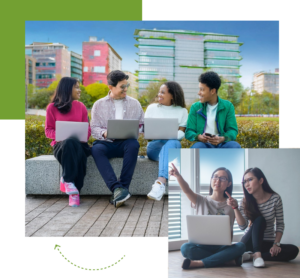The Young Smart Cities (YSC) has been awarded EU funding within the framework of the Erasmus+ Programme Key Action 2 Cooperation partnerships in school education. Young Smart Cities involves eight partners who bring complementary knowledge and experience to the project and is being steered by the University of Siegen as lead partner.
 Young Smart Cities strives to provide young people aged 12 to 16 with the right knowledge and skills needed to build and grow Net Zero Smart Cities. The European Green Deal, together with the Climate-Neutral and Smart Cities mission and many other EU initiatives, aims to support Member States in achieving a collective emission reduction of 55% by 2030 and become climate neutral by 2050.
Young Smart Cities strives to provide young people aged 12 to 16 with the right knowledge and skills needed to build and grow Net Zero Smart Cities. The European Green Deal, together with the Climate-Neutral and Smart Cities mission and many other EU initiatives, aims to support Member States in achieving a collective emission reduction of 55% by 2030 and become climate neutral by 2050.
Citizen participation in this mission is crucial, and younger generations must be given a central role in this. Although young people are mostly well connected and have access to an overwhelming amount of information on the internet, only a few are aware of the concept of Smart Cities and what it entails, not to mention the skills required to design and implement future Net Zero Smart Cities.
This is why the Young Smart Cities aims to:
- Improve the general knowledge of the students about climate change and the impact and role cities can play in delivering climate neutrality as well as the technical, social and structural changes needed to implement these changes,
- Promote cooperative exchanges through an online forum,
- Identify and strengthen the skills that are needed for the developing labor market to deliver Net Zero Smart Cities, and
- Improve the students’ personal responsibility through student agency, problem-based and competency-oriented learning
The YSC online platform and the associated knowledge, tools and forum will be designed, implemented and tested with and for the students and their teachers. Stakeholders will be engaged throughout the project and will provide real-world case studies that the students will engage in. The YSC portal will motivate and support students and teachers in developing solutions to multidisciplinary challenges through, among other things, curricula, training, competitions, forums and knowledge pills. It will support the development of the skills needed to promote Europe-wide exchange, social cohesion and active citizenship.

